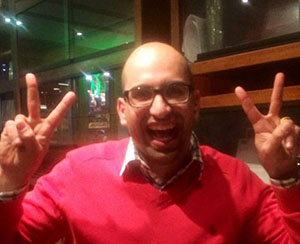
The University of Illinois’s revoked job offer to controversial anti-Israel academic Steven Salaita has gone through a handful of phases: initial outrage over his virulent Twitter posts, the school’s rush to distance itself from him, threatened lawsuit, and Salaita’s PR campaign to shame the administration.
Now the Salaita saga has morphed into something more mundane and drawn-out: a fight over Illinois’s open-records law.
The Daily Illini reports that Salaita has sued the board of trustees, saying it has repeatedly refused to turn over records that were relevant to the yanked job offer – “emails containing specified keywords sent among University officials”:
Salaita requested the documents on Sept. 17, six days after his appointment to join the University as a professor in American Indian Studies Program was officially rejected by the Board of Trustees.
The University responded to his request, saying the FOIA request was unduly burdensome and urged Salaita to narrow his request. On Oct. 15, Salaita issued a new request, which asked for emails between 15 University officials over a three-month period …
The University again orally rejected the request, stating that it would require reviewing between 8,000 to 10,000 emails. Salaita responded by requesting the FOIA again on Nov. 5, this time reducing the timeframe to just over one month. However, he claims that he never received a response.
Salaita doesn’t have much financial leverage over the school because of the small-potatoes penalties available for violation of the open-records law:
According to the Illinois Freedom of Information Act, any party found in violation of the act is required to pay civil penalties of no less than $2,500 and no more than $5,000 per violation.
The Chicago Tribune has the actual lawsuit, filed in Champaign County. It said Salaita initially wanted “nine categories of documents, including emails from 38 university officials containing at least one of 26 keywords”:
The revised request was narrowed so it targeted “emails related to outside influences that affected the decision to fire Salaita,” according to the lawsuit.
For example, it requested emails with the keywords “Palestine,” “Jewish and “Uncivil,” records show.
That may be an allusion to the theory that outraged donors drove the university to drop Salaita’s job offer.
Salaita’s lawyer makes clear this is about shaming and isolating the university:
“The university has put some documents out there about the decision, but they have not told the full story,” said Anand Swaminathan, an attorney with Loevy & Loevy, a Chicago-based firm that filed the lawsuit on Salaita’s behalf. “We believe it is extremely important, especially given the amount of interest among academics, students at the university, faculty, the media and audiences around the country.”
Academe Magazine, which is published by the American Association of University Professors, notes that Salaita’s speaking tour continues this week in New York and New Jersey.
It’s hard to see the University of Illinois coming out of this looking good.
Regardless of Salaita’s tweets that seemingly cheer for the murder of Jews, the school’s internal communications will probably reinforce the narrative that it caves on academic freedom when money is at stake.
And even if it succeeds in convincing the court that the sought records fall under exemptions, it will draw (reinforce?) a reputation as a university that fights tooth and nail for its secrecy at all costs.
Greg Piper is an assistant editor at The College Fix. (@GregPiper)
Like The College Fix on Facebook / Follow us on Twitter
IMAGE: Facebook
Like The College Fix on Facebook / Follow us on Twitter







Please join the conversation about our stories on Facebook, Twitter, Instagram, Reddit, MeWe, Rumble, Gab, Minds and Gettr.